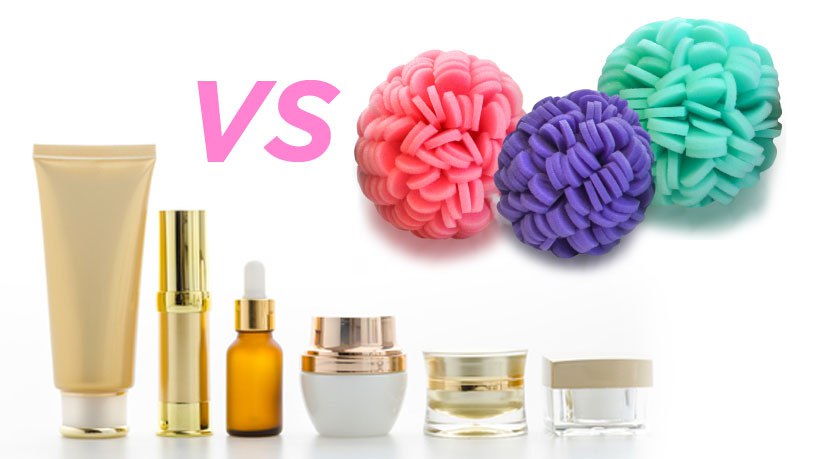As many of our readers know, exfoliation is an essential step in almost everyone’s skin care routine. But did you know that there are different forms of exfoliation that are suited to specific skin needs? Below we have detailed the most common means of exfoliation and whom they serve best.
Mechanical/Physical Exfoliation
What It Is: Mechanical exfoliation is a form of exfoliation that makes use of tools (loofahs, buffs, sponges, brushes, etc.) or abrasive substances (rice bran, oatmeal, etc.). It is meant to primarily loosen and remove flakes of dry or dead skin from the skin’s surface (The International Dermal Institute).
Who It Is Best For: If you are looking for a more even skin texture and to improve product absorption, then mechanical exfoliation may be a good choice for you. Some specialists even suggest that mechanical exfoliation can improve collagen production, though more research is needed to confirm this. However, given the inconsistency among different physical exfoliants (i.e. grains of sand, ground nut shell, salt granules, etc.) and their potential for irritation, those undergoing mechanical exfoliation should keep aware of signs of irritation. Those with rosacea, wounded skin, or otherwise sensitive skin should consult with a dermatologist before using mechanical exfoliation (Cleveland Clinic Health Essentials, Beautiful with Brains, Self.com).
Chemical Exfoliation
What It Is: Chemical exfoliation is an umbrella term for various forms of exfoliation. Exfoliation from alpha hydroxy acids (like glycolic acid), beta hydroxy acids (like salicylic acid), retinols, and enzymes (i.e. bromelain and papain) can all be considered chemical exfoliation. Typically, chemical exfoliants are applied as a peel, although you can find some in moisturizers and exfoliating serums. However, since they often contain a high concentration of potentially-irritating ingredients, chemical exfoliation peels should be not be administered too frequently (The International Dermal Institute, Cleveland Clinic Health Essentials).
Who It Is Best for: If you want to exfoliate your skin thoroughly and treat another existing skin condition, then chemical exfoliation may be a good choice for you. Chemical exfoliation is commonly administered as chemical peels. These treatments are typically much stronger and more abrasive than those products available in your drugstore, although they can usually treat more serious or stubborn conditions. For example, certain peels are able to treat the appearance fine lines and wrinkles, acne, scars, aging, sun damage, and hyperpigmentation, among other ailments. Owing to their aggressive means of exfoliation, those undergoing chemical peels (and most other forms of chemical exfoliation) should avoid direct sunlight for 6-10 days and be particularly vigilant about regularly applying sunscreen. While you can find over the counter products containing chemical exfoliations (such as salicylic acid or glycolic acid), these are typically not as potent as chemical peels. Nevertheless, owing to their lower concentrations, over the counter products containing chemical exfoliants can typically be administered more frequently than peels (which are usually done at a dermatologist’s office) (Esthetica MD, DERMAdoctor).
Bottom Line
There are numerous forms of exfoliation – loofahs, buffs, body brushes, chemical peels, exfoliating scrubs – but almost all fall under the category or mechanical or chemical exfoliation. Mechanical exfoliation makes use of abrasive tools that can loosen dead skin cells and debris, whereas chemical exfoliation relies on ingredients to slough away dead skin. While no method of exfoliation is superior to another, each method has its own strengths. To determine which is best for your skin type, make sure to consult with your dermatologist before adopting or altering your exfoliative routine.








Comments 1
Great article! Very knowledgeable and detailed. Usually I am exfoliating my skin only with mechanical exfoliants but I’ve heard so much about the SOLVADERM Glowpeel treatment that now I want to go for some chemical peelings! I am sure that any exfoliator if used correctly always gives your skin healthy glow and radiance.